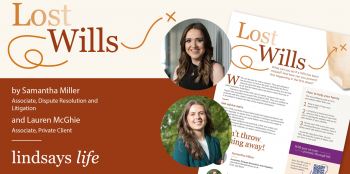We often get asked “Why do I need a Will?”
Many people assume that even if they don’t document their intentions in writing prior to their death, their assets will simply pass to who they intend to leave them to anyway, such as a spouse, civil partner, cohabitant or their children. They believe that if these family members are going to receive their assets anyway, there is no point in preparing a Will before they die and that is just a waste of time and money.
In fact, getting your affairs in order prior to your death by preparing a Will is usually far less costly than the additional time and expense involved in administering an intestate estate (the estate of someone who has died without leaving a Will) after an individual has passed away.
Therefore, it’s worth keeping the following three points in mind when considering whether or not to instruct a solicitor to prepare a Will on your behalf:
1. Appointing executors to deal with your estate
When a Will is prepared by a solicitor, one of the first clauses appoints certain individuals as chosen by the Will maker (known as the testator) to be responsible for ingathering and distributing their assets after their death. These chosen individuals are known as the executors of the estate.
It is usually only the executor(s) of the estate who will be able to engage with banks and other institutions with which the deceased individual held assets. As such, if there is not a Will which appoints an executor in clear terms, this is usually the first stumbling block that the surviving family will come to when trying to administer the estate.
If no executors have been appointed in a Will (an executor nominate) who could easily act/progress matters from the outset, the family will instead have to apply to the Sheriff Court to have someone appointed as an executor dative (a court appointed executor) to then allow them to begin administering the estate.
This is both an expense generated from the estate and will often hold up matters which could easily have been dealt with had a Will been put in place prior to the individual’s death.
2. Requirement of a Bond of Caution
Once an executor dative has been appointed by the court, it may then seem relatively straightforward for the executor to correspond with the various institutions with which the deceased held assets.
However, most estates will then require a Certificate of Confirmation (confirmation) to be obtained from the Sheriff Court first. Then the executor(s) will have legal title to deal with the assets within the estate, such as selling a property that the deceased owned, transferring or selling shares or simply closing a bank account if the funds held within the account are more than simply minimal.
If the deceased had left a Will, the executor could easily apply to the Sheriff Court from the outset to obtain the required confirmation. However, where there is no Will, in many cases, the Sheriff Court will require a Bond of Caution (pronounced ‘kayshun’) to be obtained by the executor(s) before confirmation will be granted.
A Bond of Caution is essentially an insurance policy which protects against the incorrect distribution of an estate by an executor as there is an increased risk of the wrong individuals receiving the estate assets where there is no clearly written Will.
Again, the need to apply for a Bond of Caution will increase the time involved in the estate administration process and can be costly to obtain, depending on the value of the estate.
3. Be certain on who will receive your assets
Do not simply assume that your entire estate will pass to the individuals who you wish to receive your assets even if you do not leave a Will. If you do not prepare a Will, your estate will be administered in accordance with the legislation on intestate succession.
It could be the case that your spouse will inherit your entire estate, however this will depend on the size of your estate. In larger estates, while the spouse or civil partner will definitely receive a certain proportion of the estate, some of your estate may pass directly to children or indeed to other family members in the absence of children.
This is also extremely important with regards to those wishing their cohabitant to receive their estate. Unlike spouses and civil partners, cohabitants do not have an automatic right to their partner’s estate if no Will has been made. They would have to make an application to the Sheriff Court to obtain any benefit from the estate, which will be at the discretion of the Court.
It is therefore imperative to make a Will if you want to be absolutely certain that the individuals who you wish to receive your assets do so and that your estate is not instead passing to family members or individuals who you did not intend on benefitting from your estate.
So, to answer the question “Why do I need a Will?”
As well as ensuring that your loved ones receive what you would like them to receive from your estate and giving you absolute control over this as opposed to simply leaving your estate to be distributed in accordance with legislation set out by the government, not having a Will and leaving your family to administer an intestate estate will result in additional delays and expense in the estate administration process.
As the additional fees and time involved with administering an intestate estate will no doubt outweigh the fees and time involved in the preparation of a Will prior to your death, we encourage you to instead ask yourself:
“Is it worth not having a Will?”
If you would like to put a Will in place or indeed update your Will to reflect your current intentions, please contact our Private Client team and we will be more than happy to help.






